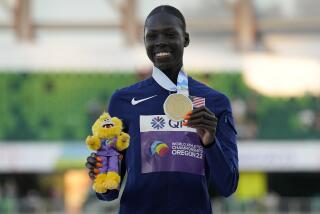‘Ma’s Army’ Deserted Him, but He’s Building a New One : Track: Controversial Chinese coach, his runners and his turtle blood and caterpillar fungus tonic are nowhere to be seen at the World Championships.
- Share via
BEIJING — In track and field’s 1993 World Championships at Stuttgart, Germany, a team of Chinese athletes known as “Ma’s Army” left the other runners gasping at their out-of-nowhere performances that were as magnificent as they were mystifying.
The former farm girls from northern China won every distance event from 1,500 through 10,000 meters, then shattered three world records in the National Games at Beijing the next month.
Some believed their sudden success was due to banned, performance-enhancing drugs, but their eccentric coach, Ma Junren, said the secret was a strict training regimen of a marathon a day--and a special tonic of turtle blood and caterpillar fungus. Laboratory tests vindicated him, and a Guangzhou company bought the secret recipe for more than $1 million.
In this year’s World Championships at Goteborg, Sweden, 17 women--six of them runners--from China will compete. None is from Ma’s Army, and none is expected to stun the crowds as the team did two years ago. Indeed, only one woman competes in distance events. Whatever happened to the flamboyant coach and his hard-running soldiers whose fame was as fleeting as their feet?
Maybe it was the mass appendectomies. Ma forced 11 runners to have “preventive” operations on the same day. Or the way Ma “invested” the women’s prize winnings and held onto the Mercedes Benz awarded to them at Stuttgart--for safekeeping. Maybe it was his throwing of a runner’s suitcase out a fifth-floor window during an argument about her performance. Or perhaps it was just too much turtle blood.
Despite a year and a half of record-setting, 17 members of Ma’s Army walked out on him last December, including team star Wang Junxia, who temporarily took over as coach.
“We couldn’t take it any longer,” Wang told Reuters. “We had no freedom. We were on the brink of going crazy. The pressure was too intense.”
The team’s workout schedule started at 4:30 a.m. with a 23-kilometer (14.7-mile) run before breakfast, as Ma trailed in his car. After a strategy session and lunch, the women ran another 20 kilometers (12.8 miles) around a track. By the time lights went out at 8:30 p.m., the women had run the equivalent of a marathon--every day.
“I don’t allow them to make phone calls, watch TV, meet friends or do interviews before a big contest,” Ma explained.
Men, makeup and long hair simply got in the way. “Sometimes I am very hard on them and even have to beat them so they can overcome their laziness,” he said. “I know some of my techniques are too rough. But my intentions are good.”
For runners such as Wang, good intentions weren’t enough. The world-record holder in the women’s 3,000 and 10,000 meters, and winner of the 1994 Jesse Owens Award, said she always felt ill. In addition, she charged Ma with abuse and mismanaging the athletes’ money. Always the front-runner, she led the rest of the group to the Liaoning track and field team, where they resumed training under Coach Mao Dezhen.
Under their new regime, the former champions have not done well and are mocked in Chinese newspapers for forsaking their mercurial coach and the country’s glory. A Shanghai newspaper called the team “soft” and “undisciplined” after it lagged five minutes behind Japan in Beijing’s international road relay in March. “Go home to Ma,” one headline read.
Ma said: “They are training unsystematically. They are not running a marathon a day any more.”
Of his medalists from the 1993 World Championships, only one, Wang, qualified for Goteborg in this year’s national meet. But her time in the 5,000 was so non-competitive on the world level that the Chinese federation decided not to send her.
“It is impossible for her to beat the world in the way she did during the last championships,” a Chinese official told the Shanghai Daily Liberation. “It would be a big shame if she went to Goteborg and achieved miserable results.”
Only two years ago, the world’s six fastest women in the 1,500, 12 fastest in the 3,000 and seven fastest in the 10,000 were Chinese. This year, Chinese women do not rank among the world’s top 50 in the 1,500 and 3,000 or among the top 30 in the 10,000.
“Now, all they are is numbers in a book,” Ireland’s Sonia O’Sullivan, among the favorites in the 1,500 and 5,000 at Goteborg, told the Chicago Tribune. “There are no people to match the numbers. They have vanished.”
The chain-smoking Ma, too, has had a rough spell since the split. He became ill with throat cancer, was injured in a car crash, and his father died. Fed up with his flamboyant ways and mounting commercial interests, Chinese officials stripped him of his post.
Not one to quit a race, Ma has assembled a new group of foot soldiers in Dalian to make up another Ma’s Army, and the ranks include a few familiar faces.
Wang Yuan, the world 800- and 1,500-meter champion, made a carefully brokered comeback to Ma’s camp last month. Another runner, Bai Yu, was sent back by her parents. Qu Yunxia, who also set records at 1,500 meters, never left.
Ma always thought they’d come running back but has given a cool reception to those who re-enlisted. “When they left, their minds left, too,” he told the Xinmin Evening News. “Now they’re the same as newcomers.”
Ma said it usually takes 10 years to build a championship team, though he can do it in four. But even with his super powers, China will not be a running force again for a while, he said.
In the meantime, pass the caterpillar fungus.
Times staff writer Randy Harvey from Goteborg, Sweden, contributed to this story.
More to Read
Go beyond the scoreboard
Get the latest on L.A.'s teams in the daily Sports Report newsletter.
You may occasionally receive promotional content from the Los Angeles Times.






